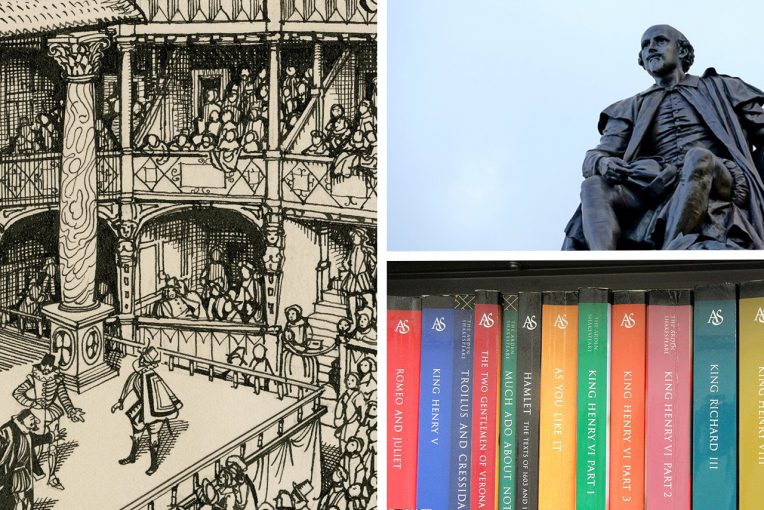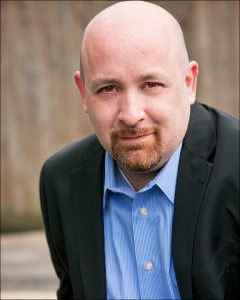Theatre continues to adapt to the new challenges of the coronavirus (COVID-19) pandemic. In November, the School of Theatre and Dance at Illinois State University will present Richard III online, setting Shakespeare’s drama of power and political manipulation in a 21st-century corporate world. Assistant Professor Kee-Yoon Nahm spoke with director and Assistant Professor John Tovar and dramaturg Samuel Langellier about this exciting project to bring Shakespeare to physically distanced audiences. This interview has been edited for length and clarity.
Kee-Yoon Nahm (KYN): What is your approach to Richard III?
John Tovar (JT): Richard III is a story of good versus evil. It is old school in that way. But there is much more to it than that. Even if you see Richard as being evil, there is a reason why he does what he does. Some people will see it as selfish. Others will see it as an opportunity for political change. We want to make sure that audiences can understand the why, even if they do not like what Richard is doing. This can then make us a little more empathetic to people on the other side, politically speaking. It is not that we have to agree with them. But we can at least see why they are doing it, which can lead to discussions about what exactly is the best solution to a particular problem. We cannot deny that, currently, there are political upheavals taking place not just in the United States but all over the world. I remember as a kid, my family would never talk about politics at the table. It was taboo. I understand why. People have such strong opinions about what is right and wrong, it can create rifts among individuals who are ultimately supposed to love each other. But we must have those tough yet necessary conversations. I think if we can look at a work of theatre and ask what happened in that situation, we can distance ourselves a little from it while also seeing the parallels to current society.
KYN: Sam, what connections do you see between the play and society now. What about the play leaps out at you as being relevant?
Samuel Langellier (SL): Although power structures may have changed, power in and of itself has not. The people at the top are still playing with the same currencies they have always played with: power, money, control, and loyalty.
KYN: Right, society may have become more complicated, but the basic political machinery remains the same. That leads to my big question: what is the concept that you are bringing to Shakespeare’s play?
JT: Because of social distancing, we felt that setting it in modern times was the simplest thing we could do because we could easily look in somebody’s closet and find a suit that fits them. Given especially the election coming up, I also knew I did not want to tell a one-sided story, a clear-cut red versus blue political statement. We tweaked the setting into a corporate structure, a conglomerate with different subsidiary companies. The head of the conglomerate is analogous to the King in Shakespeare’s play, while the leaders of the smaller companies are the Dukes.
“I think if we can look at a work of theatre and ask what happened in that situation, we can distance ourselves a little from it while also seeing the parallels to current society.” – John Tovar
KYN: Sam, as the dramaturg, what has been your role in fleshing out this modern corporate world?
SL: I decided to create a website because I thought it could be a way to get dramaturgy to the cast while also having something solid for audiences to anchor to, showing them this larger world. Part of that process has been seeing what connections we can draw between the play and the media we consume regularly. I am still in the middle of fleshing all that out. My next step is to develop the subsidiary companies further by giving each president their own PR speech: why what they are doing is great, why you should be picking their company over other companies, and stuff like that. For example, the Gloucester faction in Shakespeare’s play has become Gloucester Robotics, which is Richard’s main power base. We also have Richmond Securities, which plays well into the overall conflicts in the play and the final staging of the war as a kind of cybersecurity threat.
KYN: John, I am sure you have opinions about wars in Shakespeare in general, not only as a director but also a fight choreographer. But what additional challenges are there when you are presenting a play on Zoom?
JT: That was a huge challenge. Nobody can be in the same room with each other so we cannot do any kind of realized violence. So how can we make this work? One day as I was driving, I was thinking about one of the most famous lines in the entire play: “My horse, my horse, my kingdom for a horse.” I was wondering how this line could work because we cannot take out such an iconic line. Then it popped into my head that there is a type of computer virus called a trojan horse. Then I thought, what can a trojan horse do to a company? The answer was, ultimately, shut it down. Trojan horse viruses can go so far as to shut down cities’ power grids and things like that. Some have the ability now to hack into other people’s phones, their homes, their cars, and change something. And that is power. There is a quote from one of the newer James Bond films, Skyfall, that I thought about where Q says: “I can do more damage on my laptop sitting in my pajamas before my first cup of Earl Grey than you can do in a year in the field.”
KYN: In that sense, the Zoom platform could be an asset rather than a limitation. It already involves people sitting in front of computers engaging with a digital world. Going back to the trojan horse that led to this idea, it is interesting that you forced yourself to preserve Shakespeare’s language while interpreting it in clever ways. I know that your goal is to leave the text intact, aside from some changes in pronouns. What led to that decision? Why did you decide not to write an adaptation based on these ideas about corporate politics and information wars?
JT: Part of it comes back to me as an actor. I am not the playwright. The playwright wrote the words in a particular order for a particular reason, and I feel as an actor it is important for me to honor that. I think it also serves as a good pedagogical opportunity for the students to work with Shakespearean text. It is fun to find the balance in terms of making it accessible to a 21st century audience but still have that sense of the beauty and the splendor that is Shakespearean poetry.
KYN: One significant change that you made to Shakespeare’s play is dividing it into two parts that will be presented a week apart. Although some of Shakespeare’s other history plays come in multiple parts, it is not common to divide a single play into multiple performances. What led to that decision?
“It is fun to find the balance in terms of making it accessible to a 21st century audience but still have that sense of the beauty and the splendor that is Shakespearean poetry.”- John Tovar
JT: In the last seven months of being on Zoom, one thing that has become very real is Zoom fatigue. Since we are staging theatre digitally, I thought we could look at it almost like a television miniseries. I heard a gentleman’s voice in my head, announcing: “Tune in next week for the exciting conclusion of …” This gives us more time to prepare for each part. Because of social distancing, the actors will have to remember to change backgrounds and costumes themselves. We do not have a backstage crew to help with quick-changes or props. By splitting it up, the actors will be able to breathe more and focus on their performance. Once we get through Part 1, we do not have to worry about that anymore. The actors can forget their lines and focus on the lines for Part 2. I am excited to see how well it works. It is pushing the envelope in terms of how we think of theatre. I think about some of those six-hour theatre sessions in Chicago where they bring in lunch for you. That is one way of pushing the envelope, and I think the two-part format is another way that we can think about doing that in the current situation.
KYN: I am interested in what the audience experience will be like. I have been in situations where I am having an amazing conversation with someone during intermission about what just happened. But then we have to stop because the second act is beginning. Granted, I do not want to go home at midnight after four hours in the theatre. But I would like some more time to reflect on what I just saw before experiencing the conclusion of the story. I think that spreading the two parts by a week will give audiences an opportunity to think more about the story and characters in anticipation of the next part.
JT: That is really the hope. I think it would be incredible for the audience to have those discussions and debates. And they would do it with only so much information to focus on. In a sense, it will be easier because they are not thinking about the play as a whole. They are only thinking about Richard’s rise to power in Part 1. They can worry about his downfall after that. It is a great opportunity, and I hope that it will play well for our audiences.
Beyond the Stage is an article series on the dramaturgy of Shakespeare productions in the current season. These articles explore the plays from a wide range of perspectives, from history and literary criticism on the original works to interviews with directors and creative teams.



